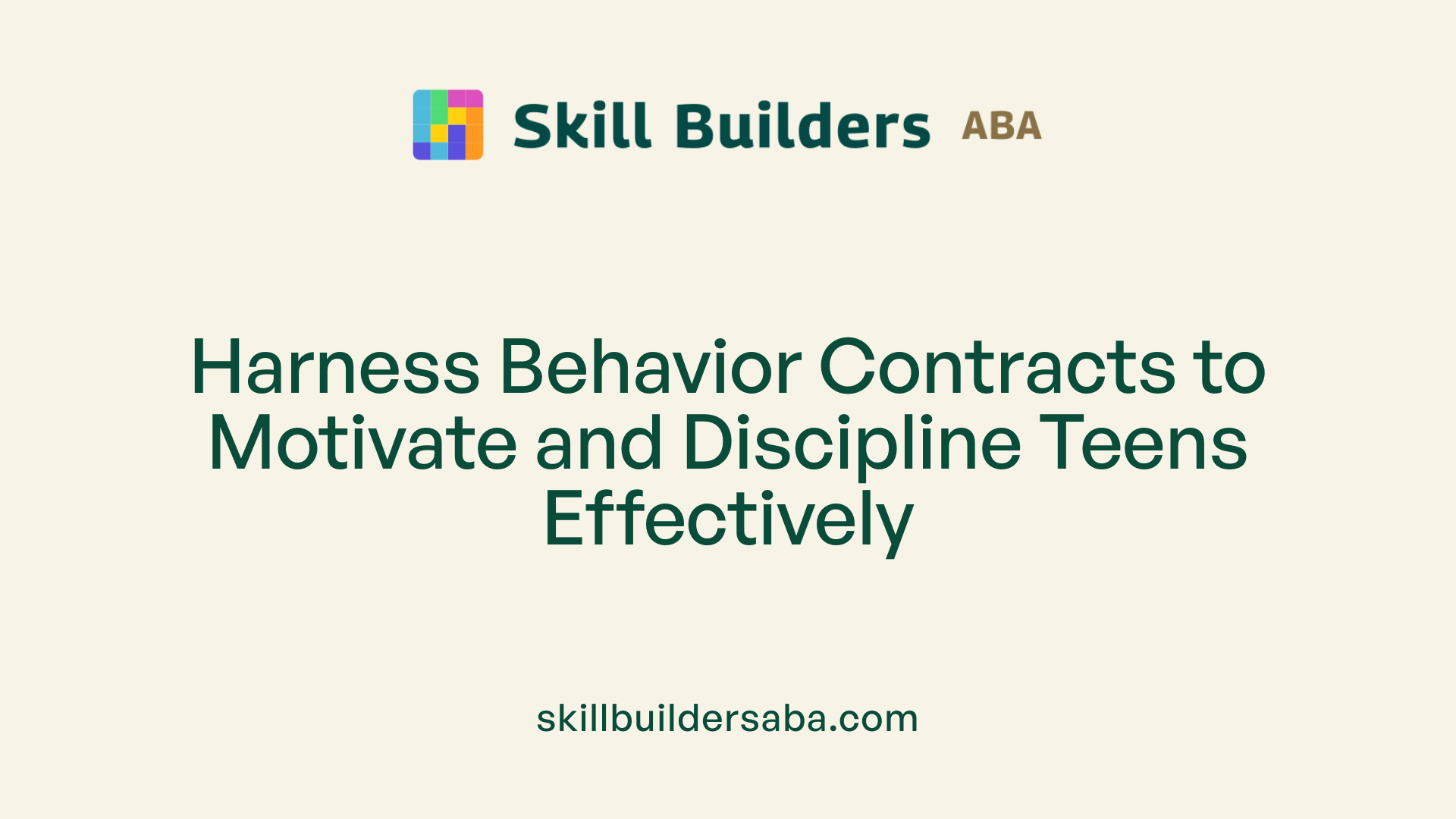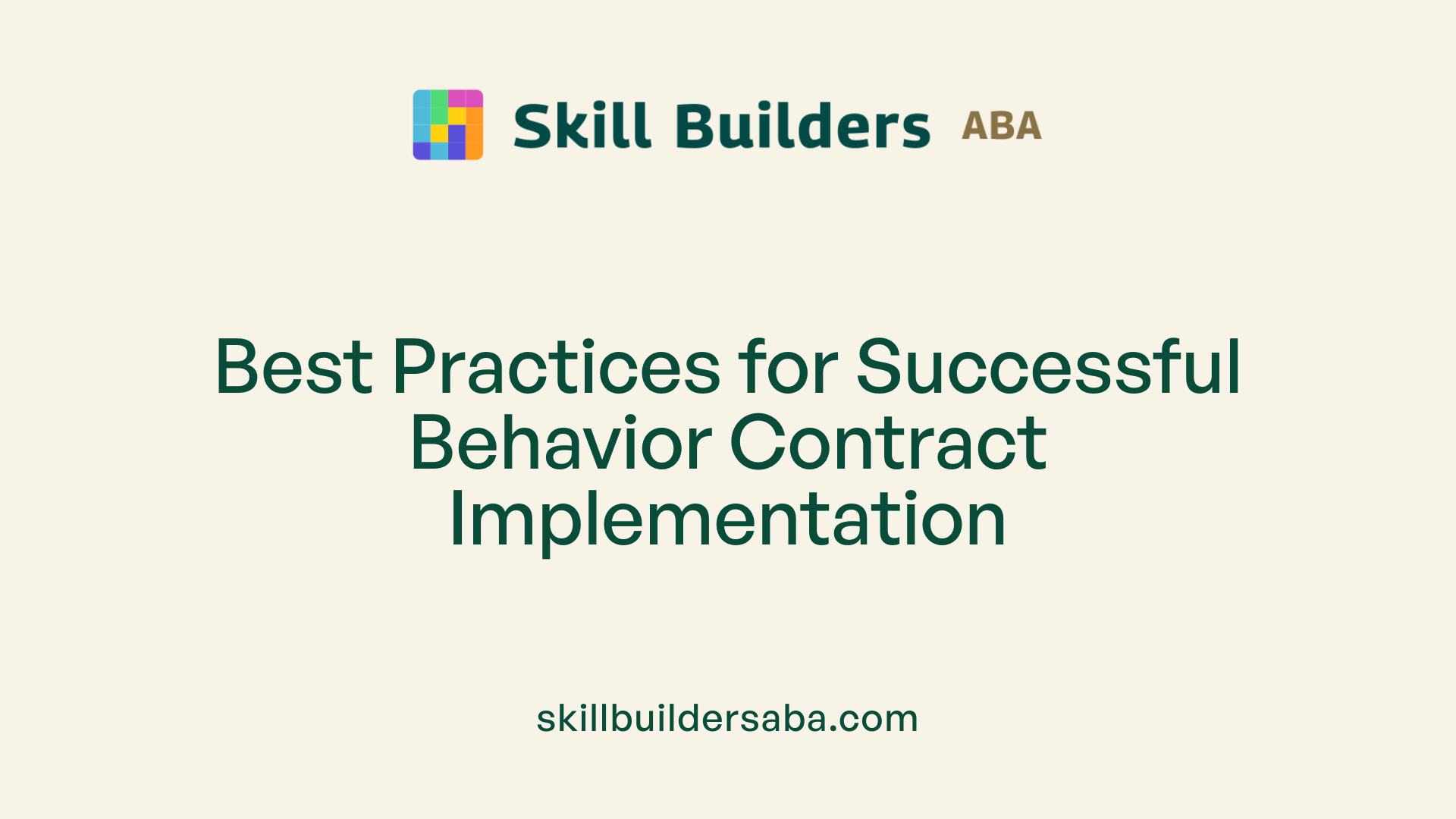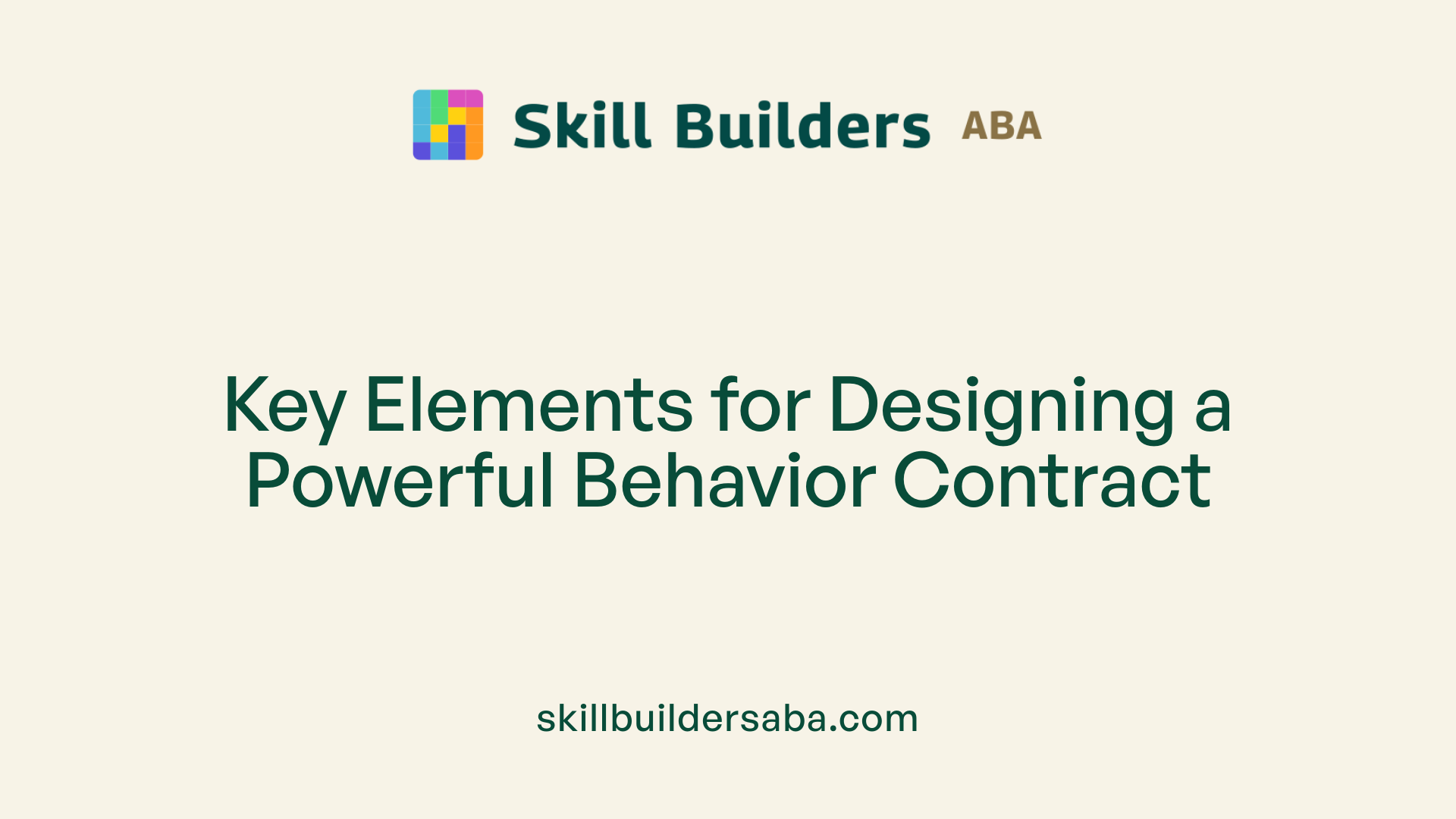How to create a behavior contract for older children
Empowering Responsibility in Teens: Personalized Behavior Contracts

Understanding Behavior Contracts and Their Significance
Creating a behavior contract for older children is a strategic approach to promote responsibility, self-control, and positive behavior. It is a mutually developed agreement that clearly articulates expected behaviors, rewards, and consequences, fostering accountability and motivation. This article explores the essential elements, development steps, best practices, and practical tips for designing effective behavior contracts tailored for adolescents.
What Does a Typical Behavior Contract Look Like?

Structure and Content of a Standard Behavior Contract
A typical behavior contract is a formal, written document that specifies expected behaviors, reinforcement strategies, and consequences. It begins with the child's name and the purpose of the contract, establishing clear objectives. The contract lists targeted behaviors, such as completing homework or staying in seat, with precise, measurable descriptions.
Next, it details the duration of the agreement, often between one to three months, and defines how progress will be tracked—using tools like checklists, tally sheets, or charts. Rewards or reinforcers are clearly outlined, such as extra screen time or stickers, with specific instructions about how and when they will be provided.
Consequences for not meeting behavioral goals are explained in a positive, non-punitive manner, emphasizing earning privileges rather than losing them.
Finally, all parties involved—child, parents, teachers—sign the contract to show agreement. Regular review dates are scheduled to assess progress and make necessary adjustments.
Steps to Develop a Behavior Contract for Older Children
 Creating an effective behavior contract for an older child involves several carefully planned steps that focus on clear objectives and active participation.
Creating an effective behavior contract for an older child involves several carefully planned steps that focus on clear objectives and active participation.
First, it is important to identify goals that are SMART—Specific, Measurable, Achievable, Relevant, and Time-bound. These criteria help ensure that the goals are realistic and clear, providing a solid foundation for behavior change.
Next, involve the child in the process of developing the contract. This participation increases their sense of ownership and motivation to adhere to the plan. During discussions, work together to decide on the rules, expectations, and consequences, making sure the child understands and agrees to each component.
The contract should include the child's name, the targeted behaviors, and a specific timeline for achievement. It is beneficial to create simple, measurable criteria for success, such as “stay in seat during class for 30 minutes” or “complete homework without reminders.”
Once the contract is drafted, display it in a prominent place where both the child and family members can see it regularly. Regular review—such as during family meetings or check-ins—helps track progress, provide praise for successes, and make necessary adjustments.
Flexibility is essential. Periodic revisions based on the child's progress keep the contract relevant and motivating. This ongoing process encourages responsibility and helps establish positive habits.
In summary, a well-developed behavior contract combines clarity, collaboration, and regular review. This structured approach promotes responsibility, enhances motivation, and fosters meaningful behavioral improvements in older children.
Using Behavior Contracts as Discipline and Motivation Tools for Adolescents

How can behavior contracts be used as a discipline or motivation tool for adolescents?
Behavior contracts serve as an effective way to motivate teenagers by clearly outlining expectations, goals, and rewards that are mutually agreed upon. This transparency helps foster accountability and self-regulation.
Involving adolescents in creating these contracts increases their sense of ownership and commitment. When teens participate in setting the rules and choosing rewards, they are more motivated to adhere to them. The contracts provide a structured framework with consistent feedback, which reinforces positive behaviors and discourages problem behaviors.
For example, a contract might specify that a teen earns extra screen time by completing homework on time or staying in their seat during class. These tangible rewards, coupled with clear consequences for unmet expectations, encourage teenagers to develop self-control and social skills.
Behavior contracts are particularly useful for adolescents facing behavioral challenges, such as ADHD, oppositional behaviors, or difficulty managing social interactions. They facilitate better communication between students, parents, and teachers, aligning everyone on shared goals.
Overall, using behavior contracts supports adolescents in developing responsibility and motivation, essential for their social and emotional growth.
Implementing Behavior Contracts Effectively

How can collaboration in creating a behavior contract increase its effectiveness?
Involving adolescents in designing their behavior contracts fosters a sense of ownership and commitment. When teens participate in identifying target behaviors, choosing rewards, and setting realistic goals, they are more likely to be motivated to meet expectations. Collaborative creation also helps ensure that the expectations are clear and attainable, reducing misunderstandings and frustration.
Why is defining specific and measurable behaviors important?
Clear, specific behaviors that can be objectively measured make it easier to track progress and provide concrete feedback. For example, instead of saying "be responsible," a contract might specify "complete homework assignments on time." Measurable behaviors prevent ambiguity and help both the teen and the caregiver recognize when expectations are met.
What role does consistency play in consequences and reinforcement?
Consistent application of consequences and rewards reinforces the contract’s effectiveness. If privileges are revoked only when agreed upon, and rewards are given promptly when goals are met, teens learn the connection between their behavior and outcomes. Consistency fosters predictability, which is crucial for building trust and establishing new behavioral patterns.
How can regular progress reviews and feedback enhance the contract?
Scheduling routine reviews—such as weekly or bi-weekly—allows caregivers and teens to discuss progress, address challenges, and celebrate successes. Regular feedback sustains motivation and provides opportunities to adjust goals or reinforcers. It also reinforces accountability and encourages ongoing communication about behavior.
Why should a behavior contract be adaptable?
Flexibility is essential because teens develop at different rates, and circumstances can change. If a goal proves too difficult or too easy, adjusting expectations and rewards helps maintain motivation and prevents frustration or complacency. Reassessing the contract every few months ensures it remains relevant and effective.
| Aspect | Recommendations | Purpose |
|---|---|---|
| Collaboration | Involve teens in creating the contract | Increase buy-in and commitment |
| Defining behaviors | Use specific, measurable expectations | Clarify what is required |
| Consequences & reinforcement | Apply consistently, focused on privileges and praise | Reinforce positive actions |
| Progress review | Conduct regular check-ins and celebrate successes | Maintain motivation |
| Flexibility | Adjust the contract based on progress and changing needs | Sustain engagement |
Mastering these best practices ensures that behavior contracts serve as a supportive tool for fostering responsibility, accountability, and positive habits in older children and teens.
Core Components of an Effective Behavior Contract

What are the key components of an effective behavior contract?
An effective behavior contract is a strategic tool designed to promote positive behavior changes in adolescents by setting clear, achievable expectations. At its core, it should explicitly specify the behaviors that are expected from the teen, along with the associated consequences or rewards. These behaviors need to be described in simple, understandable language to avoid confusion.
Involving all relevant parties—such as the teen, parents, and teachers—during the contract's creation ensures everyone understands their roles and responsibilities. This shared involvement fosters ownership and commitment, which are vital for success.
The contract should also include measurable objectives paired with specific timelines. These criteria help track progress objectively and maintain motivation. For example, a goal might be for a teen to complete homework assignments on time for a month.
Monitoring tools like checklists, calendars, or tally sheets are essential for regular assessment. Scheduled reviews—such as weekly or monthly meetings—allow the team to discuss progress, celebrate successes, and make adjustments as needed.
Importantly, the language of the contract should be positive, emphasizing encouragement and support rather than punishment. This approach increases motivation and contributes to a collaborative environment.
In summary, a well-constructed behavior contract balances clear behavioral expectations, quantifiable goals with timelines, involvement from all parties, positive framing, and regular evaluation—creating a comprehensive framework that promotes responsibility and growth in adolescents.
Setting Up and Tracking Progress with Behavior Contracts
Creating tools like checklists or charts
Using visual tools such as checklists, tally sheets, or progress charts can be very effective in tracking behavior change. These tools provide a clear, simple way for both parents and teens to see progress over time. For example, a checklist might include daily behaviors like completing homework or staying in seat during class, with boxes to check off each day.
Scheduling regular review meetings
Regular check-ins are important for maintaining momentum. Schedule specific times—such as weekly or bi-weekly—to sit down and review how well the teen is doing according to the contract. During these meetings, discuss what’s working, what might need adjustment, and celebrate any improvements.
Celebrating successes and adjusting goals
Recognizing even small successes encourages continued effort. Celebrate achievements through positive praise, privileges, or rewards. If goals are too ambitious or not motivating enough, adjust them to be more realistic or appealing. Revisiting and updating the contract every three months ensures that the expectations stay appropriate and motivating.
Using positive reinforcement and feedback
Consistent positive reinforcement boosts motivation. Acknowledge efforts with praise, tangible rewards, or privileges that matter to the teen. After reviewing progress, provide constructive feedback, emphasizing what the teen is doing well and gently guiding improvements where needed. This ongoing communication helps build a sense of responsibility and confidence.
Monitoring and reviewing behavior contracts for teens
Effective monitoring involves simple, accessible tools like checklists or charts to record daily or weekly behaviors. Consistent review sessions allow for honest discussions about progress and challenges. Celebrating progress, no matter the size, helps instill pride and motivation. If progress stalls or setbacks occur, modify goals or strategies to keep the teen engaged and feeling capable. Positive reinforcement, tailored to the teen’s preferences, plays a significant role in sustaining behavioral changes. Regularly revisiting the contract fosters a collaborative environment where responsibility and growth are celebrated.
Additional Support and Flexibility in Behavior Contracts
Involving the child in renegotiation of their behavior contract is essential for maintaining motivation and fostering responsibility. When teens actively participate in adjusting their goals and consequences, they develop a sense of ownership over their behavior changes.
Allowing flexibility in goals and consequences helps accommodate the child's growth and changing circumstances. This adaptability ensures that expectations remain realistic and achievable, preventing frustration and loss of motivation.
Providing ongoing support and encouragement keeps teenagers engaged and committed to the process. Celebrating small successes and offering positive feedback reinforce their efforts and promote continued progress.
Balancing structure and autonomy is crucial. While clear expectations provide stability, giving teens a degree of independence in managing their contract nurtures their decision-making skills and fosters maturity.
Tips for effective behavior contract development
- Create an individualized, clear, and achievable contract. Involving the teen in this process increases their commitment.
- Start with one or two behaviors to avoid overwhelming the teen.
- Schedule regular reviews to discuss progress, challenges, and necessary adjustments.
- Use positive reinforcement to celebrate successes and motivate sustained effort.
- Ensure consequences are fair, specific, and related to the targeted behaviors.
- Be open to renegotiating goals and consequences as needed.
- Offer continuous support by providing encouragement, guidance, and understanding.
Implementing these strategies creates a flexible, motivating, and collaborative environment that encourages teens to take responsibility while feeling supported throughout their behavioral changes.
Final Thoughts on Crafting Effective Behavior Contracts for Teens
Developing a behavior contract for an older child is a collaborative process that requires clear communication, personalization, and ongoing review. By involving the teen in setting goals, choosing rewards, and understanding expectations, parents and educators can foster a sense of responsibility and motivation. Regularly monitoring progress, celebrating achievements, and adjusting the contract as needed ensure that the process remains relevant and effective. When implemented thoughtfully, behavior contracts can be powerful tools to nurture positive behavior, build trust, and support adolescents in developing self-regulation skills, ultimately guiding them toward greater independence and responsibility.
References
- Create a Teen Behavior Contract
- A Step-by-Step Guide to Crafting an Effective Behaviour Contract
- [PDF] The 5 W's of Behavior Contracting
- Download: Parent-Child Behavior Contracts (Understood.org)
- How to Create a Student Behavior Contract | HMH
- Download: Parent-child behavior contracts - Understood.org
- BEST Teen Behavior Contract (Templates & Examples)
- 41 Effective Behavior Contract Templates (+Examples) - TemplateLab
.svg)













